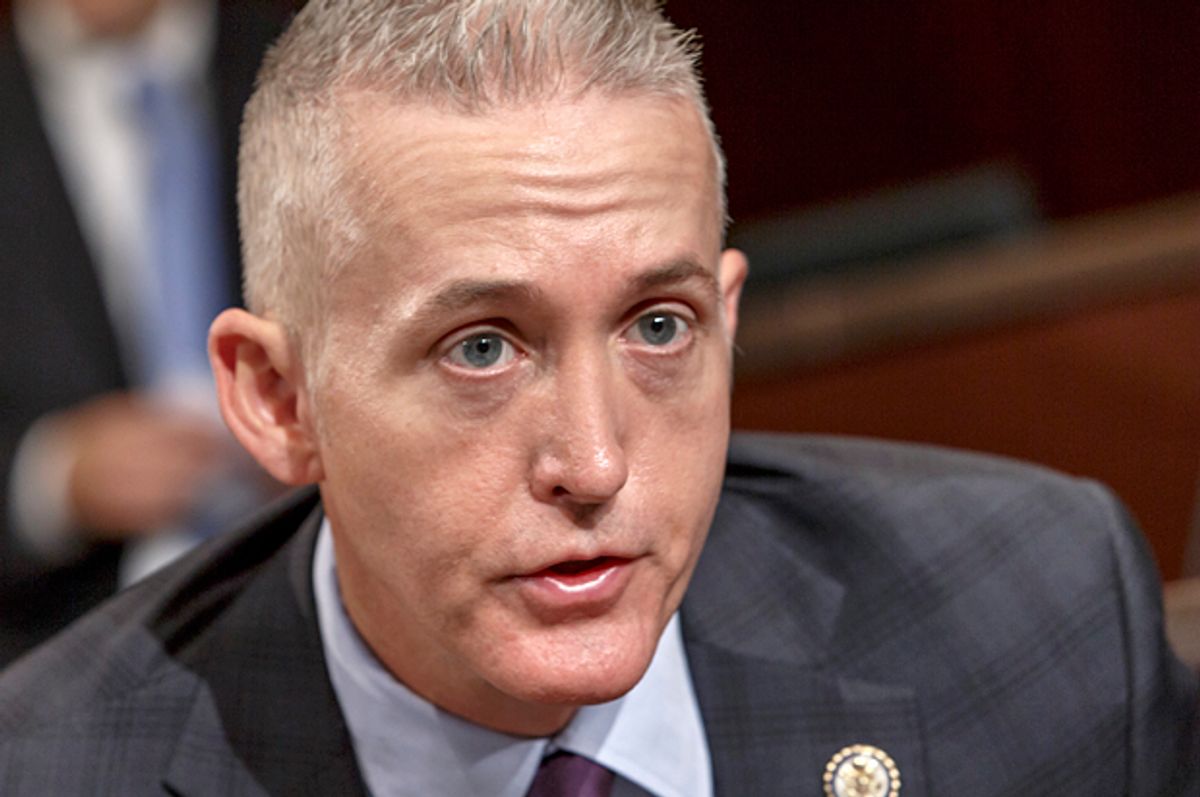The House Select Committee on Benghazi has now held two hearings into the 2012 terrorist attacks, and both have offered some informative glimpses into the State Department’s procedures for assessing security threats and weighing the importance of foreign policy goals against the risks to diplomatic personnel. That is to say that both hearings have been extraordinarily dull. And that’s not at all a bad thing – congressional hearings aren’t supposed to be entertainment. They’re the public face of congressional oversight, which is rarely exciting.
If I’m a conservative who’s had it drilled into my head that Benghazi is a perfidious cover-up, then I’m starting to get a little antsy. Trey Gowdy’s special select committee was supposed to be the investigative body that would finally find the “smoking gun” or whatever it is that would prove the Obama administration orchestrated some sort of conspiracy related to Benghazi. There was griping on the right after Gowdy’s first hearing demonstrated a lack of “passion” about the attacks, and the latest hearing was just as staid. “A low-key hearing that produced little new information,” in the words of Politico.
But take heart, you conspiracy-minded folks out there, because it looks like the outrage-inducing stuff you’re looking for is on the way. At least, that’s the impression I got from Gowdy’s opening statement, which was dotted with allusions to the standard Benghazi scandal fare.
In his opening remarks, Gowdy read from a motion the Justice Department filed against captured Benghazi suspect Ahmed Abu Kattalah, which described the attacks on the State Department’s diplomatic compound in Benghazi and the nearby CIA annex. Gowdy saw significance in the terminology used:
It is interesting to note the word – “terrorist” – so rarely used by those in positions of responsibility in the days and weeks after Benghazi is now the very word used in the very statute charging the very defendant accused of killing our four fellow Americans. “Conspiracy to Provide Material Support and Resources to Terrorists Resulting in Death”—that is the charge now. But in the days after the attack in Benghazi the word “terrorist” was edited out and changed. Now, the administration uses the word “attack”. But in the days after the attack in Benghazi the administration edited out and changed the word “attack”. It’s one thing to get it wrong and then eventually get it right. It was right initially. It was right the first time. Then it was edited and changed to be wrong.
What I love about this statement is that Gowdy just says that the word “terrorist” was “edited out and changed,” with no reference to what it was “edited out” of. A person with little to no knowledge of the Benghazi scandal would have a good deal of trouble figuring out what he’s talking about or why it matters. But those aren’t the people Gowdy was talking to. He was speaking to the people who are already well acquainted with the Benghazi “talking points” that lie at the center of the right’s belief that the administration engineered a cover-up of the attack’s true nature. (There’s no evidence that the administration deliberately twisted or ignored intelligence when crafting those talking points, despite Republican claims to the contrary.)
Also, none of this had anything to do with the hearing’s topic: “Reviewing Efforts to Secure U.S. Diplomatic Facilities and Personnel.” The witnesses brought before the panel were there to discuss progress made on implementing recommendations made by the State Department’s inspector general and the Accountability Review Board to improve security at diplomatic facilities. It’s one of the most important areas for oversight to emerge from the Benghazi tragedy and a worthwhile use of congressional resources. And yet, here’s the committee chairman talking about the White House’s communications strategy, the “editing” of things and the reluctance to use the word “terrorist.”
As for using the indictment against Kattalah to criticize the administration, that’s a bit rich on Gowdy’s part. One of the big “unanswered questions” that Gowdy offered up after the committee was first formed earlier this year was why no one had been arrested or prosecuted for the attacks. A few weeks later, Kattalah was in custody and Gowdy was deprived of a talking point. But Gowdy is nothing if not resourceful – if the inability to capture a suspect was proof of the administration’s failure, then why can’t the successful capture and indictment of a suspect also be proof of said failure? It’s a win-win!
Anyway, it seems clear that Gowdy was sending some reassurances to the frothing conservative masses that their patience will be rewarded, first they just have to get through the dull, forward-looking stuff. “We will have a hearings in January, February, March and until there is a full understanding of what happened in Benghazi,” Gowdy said. “We are going to answer the questions surrounding the attacks in Benghazi. We may answer some more than once. I would rather answer a question twice than risk not answering it at all.”



Shares